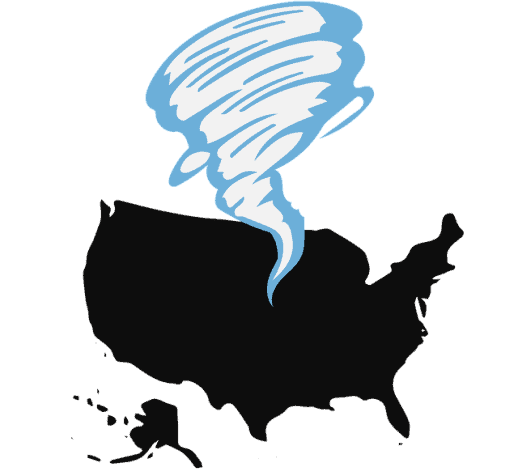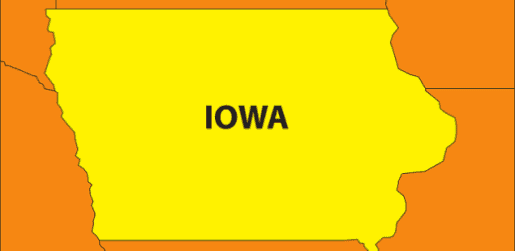Find Out If Living In Iowa Is The Right Move For You
Is Iowa a Good Place to Live? To address the question, this article digs into the heart of the Hawkeye State, exploring the most significant pros and cons of living in Iowa.
Is Iowa A Good Place To Live?
Yes, Iowa is a good place to live. The state is known for its quality of life, supported by a robust economy, high educational standards, low crime, and the limited urbanization offered by small-town living.
Moving to Iowa, however, won’t be the right choice for everyone. Thus, let’s examine the pros and cons.
Pros And Cons Of Living In Iowa: Side By Side Comparison
| Living in Iowa Pros | Living in Iowa Cons |
| 1. Low cost of living | 7. Risk of tornados |
| 2. Robust economy & jobs | 8. Extreme winters |
| 3. Top-notch school system | 9. High income taxes |
| 4. Limited urbanization | 10. Boredom is possible |
| 5. Low crime rate | 11. Landlocked & flat |
| 6. Distinct weather seasons | 12. Limited diversity |
Next, let’s dive deeper into each pro and con so you can decide if moving to Iowa is the right choice for you.

Disclosure: At no cost to you, I may get commissions for purchases made through links in this post.
Pros Of Living In Iowa
1. The Cost of Living In Iowa Is Affordable
Iowa is one of the cheapest and most affordable states in which to live.
The cost of living here is budget-friendly, sitting 5-15% below the national average, depending on where you move. From groceries to utilities and transportation, Iowa ensures your dollars stretch further.
However, the real standout is Iowa’s housing affordability, with median home prices 20% lower than the national average (Source: Redfin). It’s a financial advantage that makes Iowa a compelling choice for budget-conscious residents.
Finally, to save more money, we use the cashback app from Rakuten for all of our online purchases. I recommend you sign up for Rakuten to receive cash rebates, too. Why spend more if you don’t have to?
2. There Is An Abundance Of Jobs & Economic Opportunities In Iowa

Iowa has a strong, vibrant business environment.
The state’s economy is often stereotyped as being all about farming. Of course, industrial-scale commodity agriculture plays a big role. However, smaller-scale, more sustainable farming is also growing in popularity.
After moving to Iowa, you may be surprised to learn that manufacturing plays a significant role. Food processing, agricultural chemicals, and heavy machinery production are important parts of the state’s economic engine.
Iowa is also a top producer of electricity from wind power. Thus, the generation of renewable energy is another growing segment.
For job opportunities, the biggest employers here are a diverse group, including:
- Grocery chain Hy-Vee
- The University of Iowa
- Principle Financial Group
- John Deere
- Pella Windows and Doors
- Casey’s General Store
Putting all the facts together, US News ranks Iowa as one of the top states for economic opportunity.
3. Iowa’s Educational Opportunities Are Top-Notch

Iowa has excellent educational standards.
First, the state has one of the country’s highest high school graduation rates. Students also perform consistently on the ACT and SAT standardized tests (source: WPR).
Iowa also has top-notch colleges and universities for sharpening your skills or keeping the kids close to home for college.
Several of the state’s best public universities include:
- University of Iowa in Iowa City
- Iowa State University in Ames
- University of Northern Iowa in Cedar Falls
Two of Iowa’s noteworthy private schools include Grinnell College and Luther College. Both academic institutions are highly acclaimed but more costly than sticking with a state-funded university.
4. Excessive Urbanization And Heavy Traffic Aren’t A Problem In Iowa
Iowa’s popularity hasn’t created urbanization issues or significant traffic congestion. Traffic jams are almost unheard of.
Furthermore, most of the state’s cities and towns offer a small-town, community-minded atmosphere. For anyone desiring a more urban lifestyle, stick to the larger cities of:
- Des Moines
- Cedar Rapids
- Davenport
- Sioux City
However, you will be hard-pressed to feel the big city vibe compared to a typical major U.S. metropolitan area.
5. Iowa Boasts A Low Crime Rate

Iowa’s overall crime rate is relatively low compared to the national average.
Both violent crime and property crime contribute to the favorable statistics. Furthermore, Iowa’s crime rates have shown a favorable downward trend during the last several years.
Most Iowa homeowners do not feel the need for a security system. A vehicle break-in might be the most likely crime the average person will encounter here.
6. Moving To Iowa Means The Benefits Of 4 Distinct Weather Seasons
Iowa residents get to enjoy all four typical Midwestern weather seasons.
Iowa summers are warm. Daytime temperatures frequently rise into the 80s and 90s. Summer temperatures typically peak in July.
Conversely, during winter, January is the coldest month. The high readings on your thermometer will often struggle to pass 30 degrees. During a typical year, the state gets 2-3 feet of snowfall.
You get everything else between summer and winter extremes the rest of the year. Spring offers a welcome thaw. Cool, bright, moist spring weather brings the lush green foliage to life. Crisp fall temperatures bring out the colors of the turning leaves.
Okay. That concludes the benefits of living in Iowa. Next, we are ready for a few reasons not to move to The Hawkeye State in the first place. Unfortunately, I’m not done with everyone’s favorite topic, the weather.
Cons Of Living In Iowa
7. Iowa Residents Experience Tornados

Iowa experiences tornado activity annually. The state is located in the northern part of the U.S. tornado alley that stretches south into Texas through Oklahoma.
Iowa’s western and southwestern regions near Nebraska are the most vulnerable areas during the peak season of May and June.
8. Iowa Residents Deal With Extreme Winter Conditions
Iowa winters are a challenge even for the heartiest residents.
The combination of snow and strong winds across this primarily flat state leads to blizzard-like conditions. Cold temperatures and wind combine for wind chill factors as low as 40-50 degrees below zero.
After moving to Iowa, be prepared to bundle up to stay warm. Ensure your shovels and snowblower are ready to clear your sidewalks and driveway.
9. Iowa’s Income Taxes Are High (But Trending Lower)

Iowa currently runs a progressive income tax system. That means the more money you make, the higher your tax rate.
Under current law, Iowa residents making more than $31,051 of income are subject to a 5.7% income tax rate. That’s a high tax rate compared to many other states.
On a positive note, Iowa is reducing taxes. Starting in 2026, all residents will pay a flat rate of 3.9%, regardless of their income.
Also, retirement living in Iowa has become more tax-friendly. Recent laws exempt residents 55 or older from paying state taxes on retirement income.
These favorable tax law changes are making Iowa more competitive. One of the state’s goals is to attract tax-conscious residents away from high-tax neighboring states like Minnesota and Illinois.
10. Living In Iowa Is Boring
Iowa’s small towns and rural areas lack commercial entertainment and nightlife options.
For example, the state does not host a professional sports franchise. So, you must be open to St. Louis, Chicago, or Minneapolis options to attend a live professional sporting event.
Iowa’s culinary scene doesn’t have the breadth and variety of the big cities like New York, Chicago, and Los Angeles. Furthermore, fresh seafood options must be caught and airlifted to your table.
So, if you want dining, a robust music scene, and vibrant nightlife, Iowa may not be the place for you.
11. Iowa Is Landlocked And Flat
Iowa is landlocked. Thus, after moving, you won’t have access to ocean beaches.
Living in Iowa, however, means you will be close to the Great Lakes. Perhaps a weekend escape to the shores of Lake Michigan will fulfill your needs. For this, consider the possibilities that Milwaukee offers.
Iowa is flat. So, you won’t find mountains in this state.
After moving to Iowa, unfortunately, scenic hiking or trail riding in the mountains is out. These outdoor recreational options aren’t available
12. Privacy & Diversity Are Issues When Living In Iowa

Iowa’s small towns are great for all they offer.
However, depending on your preferences, the state’s smaller communities have disadvantages. For example, everyone knows everyone. Thus, your business becomes everyone else’s business.
Furthermore, smaller towns in Iowa have little ethnic diversity compared to other parts of the country. For example, Iowa is one of the least racially diverse states in the country, according to the Visual Capitalist.
Living In Iowa: Wrap-Up And Additional Resources

Is Iowa a good state to live in?
Iowa has much to offer residents. However, consider the pros and cons carefully because living in Iowa is not for everyone.
Best Places To Live In Iowa
Throughout the article, I mentioned several cities and towns located throughout the state. I have summarized them here for your convenience:
- Cedar Falls
- Cedar Rapids
- Davenport
- Decorah
- Des Moines
- Grinnell
- Iowa City
- Sioux City
Take a Close Look At Des Moines, Iowa
Des Moines is the largest city in Iowa. According to the Des Moines Register, the city ranks as one of the best major U.S. metropolitan areas for high salaries and low cost of living.
High-paying industries in Des Moines include insurance, banking, manufacturing, and technology. Furthermore, despite the higher earnings potential, Des Moines also maintains a low cost of living like the rest of the state.
Beyond Iowa, Other Nearby Places To Consider
If relocating to Iowa doesn’t work, consider moving to Missouri, Iowa’s neighbor to the South. You can live in the Midwestern United States but enjoy a more temperate winter climate.
Do you like Iowa’s low cost of living and small-town atmosphere but desire a warmer climate? Then consider heading straight south about 600 miles to check out Arkansas.
Okay. That’s all I have for today about living in Iowa. Good luck, no matter where you choose to settle down.
More Reading About Living Well In Iowa And Beyond
Author Bio: Tom Scott founded the consulting and coaching firm Dividends Diversify, LLC. He leverages his expertise and decades of experience in goal setting, relocation assistance, and investing for long-term wealth to help clients reach their full potential.

I Love Iowa
Hi David. Thanks for chiming in with your opinion. Iowa is certainly a good Midwestern state to call home! Tom
Extreme weather conditions made the decisions for me. Weather is almost everything. It will set your mood and possibilities to live your life outside your home. If you don’t have reasonable weather consider yourself jailed. Who likes to be jailed, rich or poor? Not me. Thanks though for all the work you have done detailing your state!
Hi Tina. Thank you for sharing what’s important to you in picking a state to live in. I’m with you on the weather. If I had my choice, the temperature would never be higher than 80 or below 25. Tom
I grew up in Iowa and could not wait to leave the State after graduating from high school. I attended college in a large metro area and never considered returning to Iowa. As an African American I knew that job opportunities in Iowa were far and few. I grew up in Waterloo, Iowa which is probably the most diverse city in the State and I would submitt that 90% of the African Americans thst I grew up with and went to high-school with, like me left the State. Recently the state has taken a turn in a more Right wing, White Nationalist direction making it even less attractive for minority professionals diversity and inclusion.
Hi Michael. Thank you for the input. I really appreciate you adding your experience and insights about Iowa here. Tom